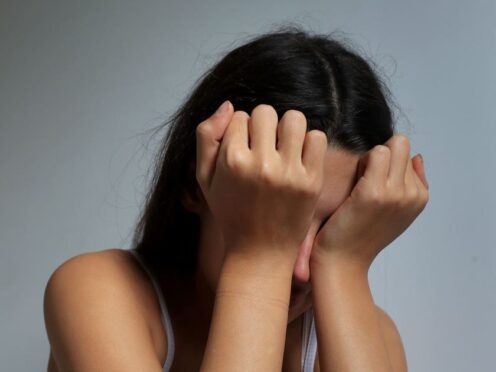People in their early 20s are more likely to be out of work due to ill health than those in their early 40s, according to a new report calling for action on Britain’s mental health crisis.
The Resolution Foundation study, funded by the Health Foundation, found that younger people with mental health problems can have their chances at a good education blighted and can end up out of work or going into low-paid jobs.
The number of young people with poor mental health is rising, according to official data.
In 2021/22, 34% of young people aged 18 to 24 reported symptoms of mental disorder, such as depression, anxiety or bipolar disorder.
That is significantly higher than in 2000, when that figure stood at 24%.
Young women are particularly affected, according to the new study, and are one-and-a-half times more likely to experience poor mental health as young men (41% compared with 26%).
The research also looked at the skills levels of young people who are not working because of ill health, and found that 79% of 18 to 24-year-olds who are “workless” due to ill health only have qualifications at GCSE level or below.
This compares with a third (34%) of all people in that age group.
Meanwhile, one in eight (12%) 11 to 16-year-olds with poor mental health missed more than 15 days of school in the autumn term of 2023, compared with one in 50 healthier classmates, the report said.
Furthermore, if children suffer poor mental health aged 11 to 14, they are three times more likely not to pass five GCSEs including maths and English compared with healthier children.
The report also uncovered the extent to which young people with mental health problems are more likely to be out of work.
Periods of poor mental health can have significant detrimental impacts on young people's education and job prospects.
Greater support in recent years has gone some way to address this, but gaps remain. Join us tomorrow to discuss what more can be done. https://t.co/jbxZVwzeMG
— Resolution Foundation (@resfoundation) February 25, 2024
Between 2018 and 2022, some 21% of 18 to 24-year-olds with mental health problems were not in work, compared with 13% of those without such issues.
Furthermore, over the past decade, those with mental health problems have been consistently more likely to be in low-paid work than those without, although some do value the flexibility, the report found.
In 2022, 40% of 18 to 24-year-olds with mental health problems who were in work were in a low-paid job, compared with 35% of healthier peers.
Meanwhile, a third of young people with mental health problems and no degree are out of work, compared with 17% of graduates with the same illnesses.
The study concluded that efforts to tackle Britain’s epidemic of poor mental health should focus on lower-qualified young people.
It also called for greater mental health support to be available in colleges and sixth forms and for more to be done to ensure fewer people leave compulsory education with low qualification levels.
Louise Murphy, senior economist at the Resolution Foundation, said: “Attention on this issue has tended to focus on higher education, but what should most worry us is when poor mental health comes together with poor education outcomes.
“The economic consequences of poor mental health are starkest for young people who don’t go to university, with one in three young non-graduates with a common mental disorder currently workless.
“To address this mental health crisis, we need better support services in currently underserved colleges, and much better provision for those resitting exams so that everyone has qualifications to build on.”
Jo Bibby, director of health at the Health Foundation, said: “Policymakers need to focus on the building blocks of health, such as good employment and education, to ensure young people get the support they need and have the tools to move through the world as adults.
“Without concerted cross-government action, we risk creating a ‘lost generation’ due to ill health.”
A Government spokesman said: “Our £2.5bn Back to Work Plan will help one million people find work and reap the benefits it has to offer, including those with long-term health conditions and disabilities.
“This sets out tailored support to get more young people into work, with work coaches and youth hubs offering advice and guidance helping young people find a role right for them.
“This is all back with record levels of support for mental health which reached £16 billion last year, including £1 billion specifically for children and young people.”
